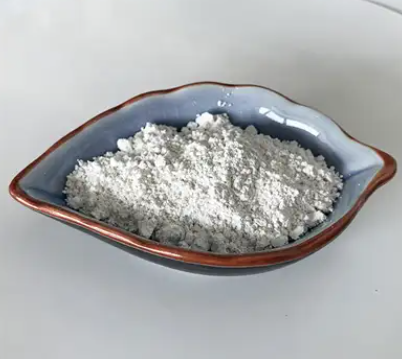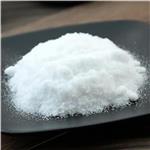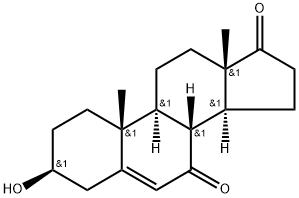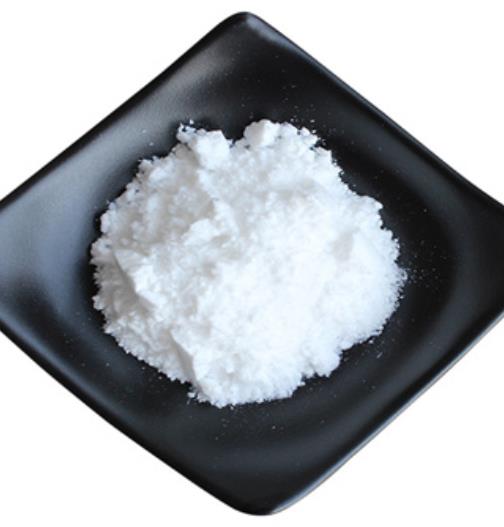Why can 7-Keto-dehydroepiandrosterone be used for weight loss?
7-Keto-dehydroepiandrosterone (7-keto-DHEA) is a by-product of dehydroepiandrosterone (DHEA), a chemical formed in the body. DHEA is a "parent hormone" produced by glands near the kidneys. But unlike DHEA, 7-keto-DHEA is not converted to steroid hormones such as androgen and estrogen. Taking 7-keto-DHEA by mouth or applying it to the skin does not increase the level of steroid hormones in the blood. 7-Keto-DHEA has been commercially advertised as a dietary supplement to support weight loss.

7-keto-DHEA has been described as a thermogenic agent with weight loss potential for the following reasons:
An increase in thermogenesis was proposed as a possible mechanism to explain the weight loss effect 7-Keto-dehydroepiandrosterone (7-keto-DHEA) is associated with. The elevation in energy expenditure manifests through an increase in metabolic rate, consequently leading to fat and weight loss. Many studies showed that DHEA and some of its derivatives are thermogenic and that their ability to induce thermogenesis increases in the following sequence: DHEA–7-α-OH-DHEA–7-keto-DHEA–7 β-OH-DHEA. Their thermogenic properties are likely attributed to increased levels of thermogenic enzymes that shuttle substrate and electrons in and out of the mitochondria and to increased proton leak across the mitochondrial inner membrane.
Like thyroid hormone, 7-keto-DHEA increases the levels of mitochondrial sn-glycerol-3-phosphate dehydrogenase (mGPDH) and cytosolic malic enzyme, indicating that they enhance thermogenesis through similar mechanisms. They use a metabolically inefficient pathway called glycerophosphate shuttle for electron transport that bypasses the NADH–ubiquinone sequence of the respiratory chain. The electron transport chain and the mitochondrial oxidative phosphorylation coupled to it are disrupted. The energy released during the electron transfer is not sufficient to uphold the proton motive force across the inner mitochondrial membrane, lowering its membrane potential and dissipating the energy from the proton motive force as heat rather than producing ATP from ADP. To generate the previous proton motive force and the quantity of ATP, the amount of electron transfer must be increased, and in consequence, more substrate, more oxygen and more stored energy from the cells are consumed. This supports the theory that 7-keto-DHEA promotes fat burning to gain energy by stimulating the fatty acyl CoA oxidase, the major enzyme in the oxidation of fatty acids.
Another mechanism could be mediated through 11 β-HSD 1, which catalyzes the conversion of cortisone to active cortisol. Elevated blood levels of glucocorticoids are associated with insulin resistance and obesity. 7-Keto-DHEA is thought to regulate the local cortisol activity through competitive inhibition of this key enzyme, as this favours the production of 7 β-OH-DHEA over that of active glucocorticoids. In addition, glucocorticoids reduce the number of uncoupling proteins, which could be cancelled out through the possible anti-glucocorticoid property of 7-keto-DHEA. Uncoupling proteins allow protons to enter the mitochondrial matrix without synthesizing ATP; therefore, free energy from the mitochondrial oxidation is converted to heat and again contributes to thermogenesis. 7-Keto-DHEA might also directly elevate the levels of uncoupling proteins.
7-Keto-DHEA and the formulas were generally well tolerated. No serious adverse side effects were reported, and none resulted in discontinuation from the trial. The relatively few side effects that are possibly related to the treatment with 7-keto-DHEA include nausea and vertigo. The formulas reported the following adverse effects: nausea, urticaria, metallic taste, heart burn, flatulence, and palpitation. The studies found no significant changes in vital signs (systolic and diastolic blood pressure, pulse rate, temperature), liver and renal function, hematological profile (including blood sugar, testosterone, and estradiol levels), or mental or emotional functioning.
You may like
Lastest Price from 7-Keto-dehydroepiandrosterone manufacturers

US $260.00/g2025-11-24
- CAS:
- 566-19-8
- Min. Order:
- 100g
- Purity:
- 99
- Supply Ability:
- 999

US $0.00-0.00/g2025-05-08
- CAS:
- 566-19-8
- Min. Order:
- 100g
- Purity:
- 0.99
- Supply Ability:
- 50t


